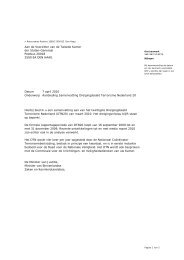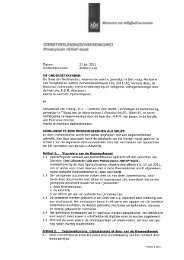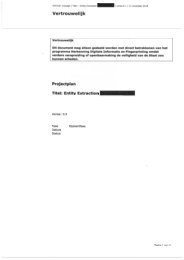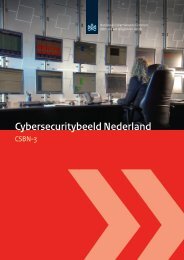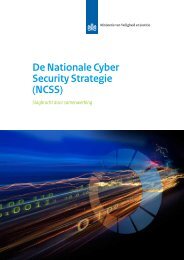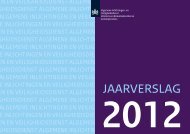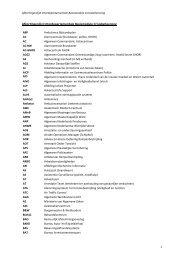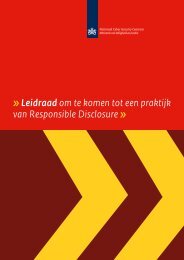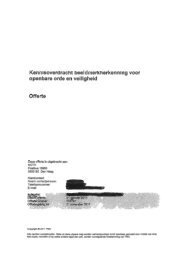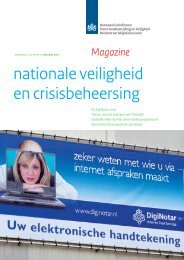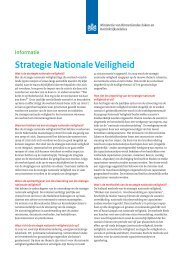third Cyber Security Assessment Netherlands - NCSC
third Cyber Security Assessment Netherlands - NCSC
third Cyber Security Assessment Netherlands - NCSC
You also want an ePaper? Increase the reach of your titles
YUMPU automatically turns print PDFs into web optimized ePapers that Google loves.
Detailed section » 1 <strong>Cyber</strong> crime<br />
»<br />
information. On this topic, the Minister of <strong>Security</strong> and Justice has<br />
announced a bill which also went into consultation in May 2013.<br />
1.5 What are consequences and costs of cyber crime?<br />
Based on research, it can be concluded that cyber crime has a<br />
considerable impact in terms of victims: the scope is constantly<br />
being better highlighted; it accounts for a major proportion of<br />
[47: Stol 2013]<br />
criminality and is probably on the increase. Recent research<br />
looked at the extent to which citizens are falling victim to cyber<br />
crime. The results show that this is frequently the case: almost as<br />
many citizens (aged 15 and up) had been the victim of hacking<br />
(4.3 per cent) as they had been of bicycle theft (4.8 per cent). The<br />
<strong>Security</strong> Monitor 2012 [120] also reports on cyber crime victimisation:<br />
its figures are somewhat higher than in the aforementioned<br />
research report (for example 6 per cent for hacking).<br />
For various reasons, the picture of cyber crime and victimisation is<br />
not complete. Companies that are attacked fear reputational harm<br />
if they report the attack. As a rule, citizens often do not report being<br />
victimized (13.4 per cent of the victims of a digital offence report it).<br />
Moreover, the police do not record cyber crime separately, making it<br />
difficult to outline a full picture of the number of reports. However<br />
it can be concluded based on the available data that the number of<br />
reports filed has increased significantly in recent years.<br />
National High-Tech Crime Unit<br />
After a good doubling of its capacity from 30 to 63 FTEs last<br />
year, the police’s National High Tech Crime Unit (NHTCU) is<br />
again on the verge of expansion. In 2014 there will be 119 highly<br />
trained digital, tactical and financial staff actively working<br />
to effectively combat high tech crime. To achieve an effective<br />
approach to ransomware, to attacks on vital infrastructures<br />
and to other occurrences of high tech crime, the NHTCU<br />
collaborates with national and international public and private<br />
partners. Mutual legal assistance to other law enforcement<br />
agencies is achieved swiftly by means of both regular MLATs<br />
and fast-track requests via the worldwide ‘24/7 network’. This<br />
guarantees all countries participating in the Convention on<br />
<strong>Cyber</strong> Crime (Budapest Convention) an immediate response if<br />
urgent assistance is needed in the joint fight against cyber crime.<br />
The financial consequences of cyber crime can be varied and<br />
far-reaching for companies and governments equally. Citizens are<br />
also noticing the consequences of identity fraud involving internet<br />
banking and skimming. In recent years, the amount of money<br />
stolen in this way has constantly increased. In 2012, this changed for<br />
the very first time. The total fraud involving payment transactions<br />
had decreased by 11 per cent in 2012 at 82 million euros. Skimming<br />
fraud fell by a good quarter from 38.9 to 29 million euros. At<br />
34.8 million euros, the fraud involving internet banking remained<br />
more or less the same (35.0 million in 2011). [37: NVB 2013] Additionally,<br />
the largest proportion of this fraud was committed in the first six<br />
months of that year (24.8 million euros).<br />
There are three possible explanations for the recent decrease in<br />
skimming: more effective monitoring by the banks, the introduction<br />
of the EMV chip (replacing the magnetic strip, which was<br />
susceptible to abuse) and by default prohibiting the use of payment<br />
cards outside of Europe (geo-blocking). Also, the 2011 arrival of the<br />
Electronic Crimes Taskforce (ECTF) is clearly bearing fruit. «<br />
120 http://veiligheidsmonitor.nl/dsresource?objectid=325461<br />
57



